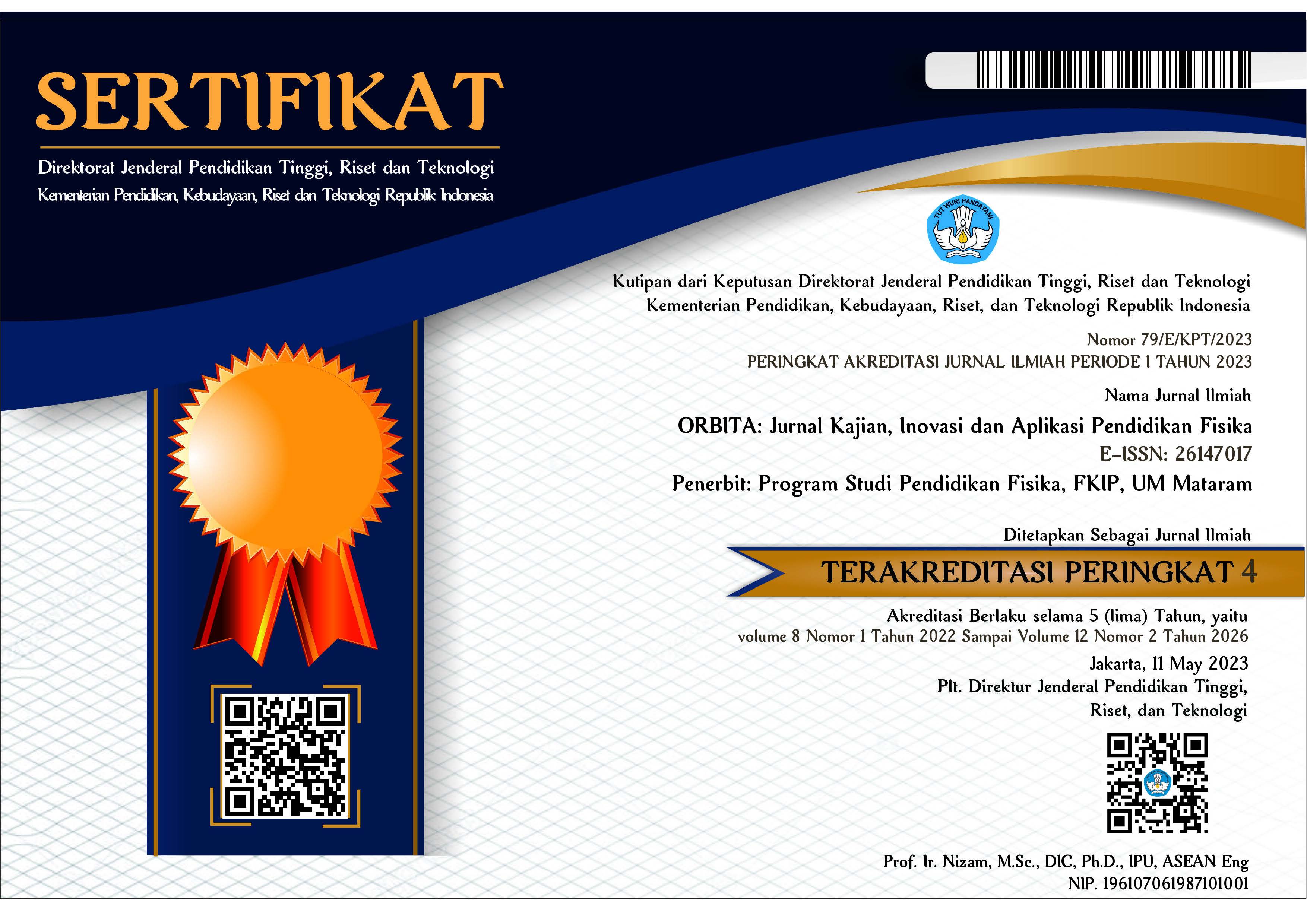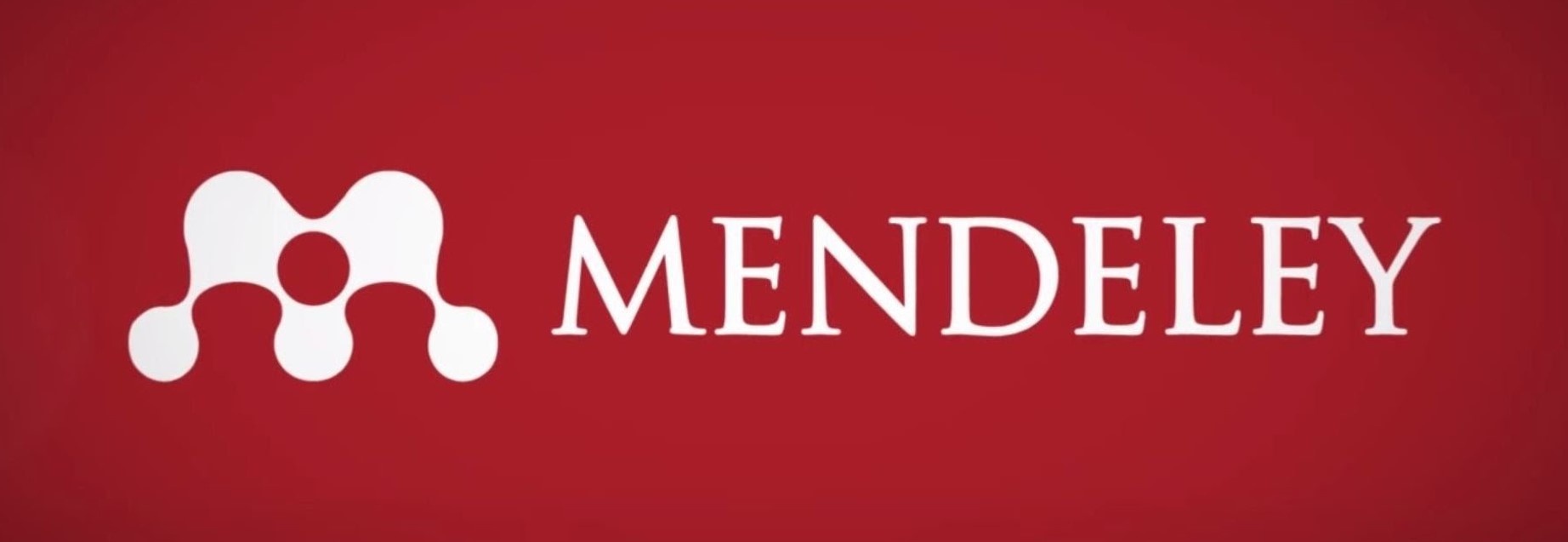KEMAMPUAN PEMECAHAN MASALAH FISIKA PESERTA DIDIK MELALUI MODEL PEMBELAJARAN INKUIRI TERBIMBING BERBANTUAN POST ORGANIZER
Abstract
ABSTRAK
Pendidikan bertujuan mendidik individu yang dapat menyelesaikan masalah dalam kehidupan sehari-hari. Kemampuan pemecahan masalah dapat dilatih dengan membiasakan peserta didik menyelesaikan sebanyak mungkin masalah melalui penerapan model pembelajaran yang tepat di kelas. Penelitian ini dirancang untuk mengintegrasikan model pembelajaran inkuiri terbimbing dengan bantuan post organizer dalam rangka meningkatkan kemampuan pemecahan masalah fisika peserta didik. Tujuan penelitian ini untuk mengetahui pengaruh model pembelajaran inkuiri terbimbing berbantuan post organizer terhadap kemampuan pemecahan masalah fisika peserta didik. Jenis penelitian ini adalah eksperimen semu dengan non-equivalent control group design. Penelitian ini dilaksanakan di SMAN 1 Gerung dengan populasi seluruh peserta didik kelas XI MIPA tahun ajaran 2019/2020. Teknik pengambilan sampel menggunakan teknik purposive sampling yaitu kelas XI MIPA 4 sebagai kelas eksperimen dan XI MIPA 7 sebagai kelas kontrol. Indikator pemecahan masalah yang dinilai adalah useful description, specific application of physics, dan mathematical procedures. Uji hipotesis menggunakan uji-t dua pihak dengan rumus t-test polled varians pada taraf signifikansi 5%. Simpulan penelitian ini adalah terdapat pengaruh model pembelajaran inkuiri terbimbing berbantuan post organizer terhadap kemampuan pemecahan masalah fisika peserta didik.
Kata kunci: inkuiri terbimbing; post organizer; kemampuan pemecahan masalah fisika.
ABSTRACT
Education aims to educate individuals who can solve problems in daily life. Problem solving skills can be trained by getting students to settle as many problems as possible through the application of appropriate learning models in the classroom. This research was designed to integrate the guided inquiry learning model with a post organizer in order to improve students' physics problem solving skills. The purpose of this research was to determine the effect of guided inquiry learning model assisted by the post organizer on students' physics problem solving skills. This research used quasi-experimental with non-equivalent control group design. This research was conducted at SMAN 1 Gerung with a population of all students of class XI MIPA in the academic year 2019/2020. The sampling technique uses purposive sampling technique, namely class XI MIPA 4 as an experimental class and XI MIPA 7 as a control class. Indicators of problem solving assessed were useful description, specific application of physics, and mathematical procedures. Hypothesis testing used two-party t-test with the formula of t-test polled variance at a significance level of 5%. The conclusion of this research indicatd that there was an influence of the guided inquiry learning model assisted by the post organizer on the students' physics problem-solving skills.
Keywords: guided inquiry; post organizer; physics problem-solving skills.
Keywords
Full Text:
PDFReferences
Ambarsari, W. (2012). Penerapan Pembelajaran Inkuiri Terbimbing terhadap Keterampilan Proses Sains Dasar pada Pelajaran Biologi Siswa Kelas VIII SMP Negeri 7 Surakarta.
Anam, K. (2015). Pembelajaran Berbasis Inkuiri: Metode dan Aplikasi. In Yogyakarta: Pustaka Pelajar.
Ausubel, D. P. (2000). The Acquisition and Retention of Knowledge: A Cognitive View. Springer Science & Business Media.
Bernard, M. E. (1977). The Effects of Advance Organizer, Sequence of Instruction, and Post Organizer on the Learning and Retention of a Taxonomy of Concepts. Australian Journal of Education, 21(1), 25–33.
Chung, S., & Cheon, J. (2010). The Effects of Post Organizers in Game-Based Learning. Texas Tech University, 23(4), 17–20.
Docktor, J., & Heller, K. (2009). Robust Assessment Instrument for Student Problem Solving. Proceedings of the NARST 2009 Annual Meeting, Garden Grove, CA, 1–19.
Gormally, C., Brickman, P., Hallar, B., & Armstrong, N. (2011). Lessons Learned About Implementing an Inquiry-Based Curriculum in a College Biology Laboratory Classroom. Journal of College Science Teaching, 40(3), 45–52.
Heller, J. I., & Reif, F. (1984). Prescribing Effective Human Problem-Solving Processes: Problem Description in Physics. Cognition and Instruction, 1(2), 177–216.
Hertiavi, M. A., Langlang, H., & Khanafiyah, S. (2010). Penerapan Model Pembelajaran Kooperatif Tipe Jigsaw untuk Peningkatan Kemampuan Pemecahan Masalah Siswa SMP. Jurnal Pendidikan Fisika Indonesia, 6, 53–57.
Hoy, A. W., & Margetts, K. (2013). Educational Psychology (3rd ed.). Pearson Australia.
Jewett, J. W., & Serway, R. A. (2008). Physics for Scientists and Engineers with Modern Physics (7th ed.). Thomson Learning.
Larkin, J. H., & Reif, F. (1979). Understanding and Teaching Problem‐Solving in Physics. European Journal of Science Education, 1(2), 191–203.
Muammar, H., Harjono, A., & Gunawan. (2015). Pengaruh Model Pembelajaran Assure dan Pengetahuan Awal Terhadap Hasil Belajar IPA-Fisika Siswa Kelas VIII SMPN 22 Mataram. Jurnal Pendidikan Fisika Dan Teknologi, 1(3), 166–172.
Novak, J. D., Gowin, D. B., & Bob, G. D. (1984). Learning How to Learn. Cambridge University Press.
Novianty, I., Sulistina, O., & Zakia, N. (2013). Efektivitas Penerapan Modul Materi Analisis Elektrokimia Berbasis Inkuiri Terbimbing Terhadap Hasil Belajar dan Persepsi Siswa Kelas Xi Semester 1 Kompetensi Keahlian Kimia Analisis Smkn 7 Malang. Universitas Negeri Malang: Jurnal-Online. Um. Ac. Id.
Oktaviani, D. G., Harjono, A., & Gunada, I. W. (2018). Penguasaan Konsep Usaha Dan Energi Peserta Didik Kelas X Dengan Model Pembelajaran Ekspositori Berbantuan Organizers. Jurnal Pendidikan Fisika Dan Teknologi, 4(2), 192–201.
Peterson, J. C., Thomas, H. L., Lovett, C. J., & Bright, G. W. (1973). The Effect of Organizers and Knowledge of Behavioral Objectives on Learning a Mathematical Concept. Journal for Research in Mathematics Education, 4(2), 76–84.
Purwanto, A. (2012). Kemampuan Berpikir Logis Siswa SMA Negeri 8 Kota Bengkulu dengan Menerapkan Model Inkuiri Terbimbing dalam Pembelajaran Fisika. Jurnal Exacta, 10(2), 133–135.
Romberg, T. A., & Wilson, J. W. (1973). The Effect of an Advance Organizer, Cognitive Set, and Post Organizer on the Learning and Retention of Written Materials. Journal for Research in Mathematics Education, 4(2), 68–76.
Selçuk, G. S., Çalýskan, S., & Erol, M. (2008). The Effects of Problem Solving Instruction on Physics Achievement, Problem Solving Performance and Strategy Use. Latin-American Journal of Physics Education, 2(3), 151–166.
Simbolon, D. H., & Sahyar. (2015). Pengaruh Model Pembelajaran Inkuiri Terbimbing Berbasis Eksperimen Riil dan Laboratorium Virtual terhadap Hasil Belajar Fisika Siswa. Jurnal Pendidikan Dan Kebudayaan, 21(3), 299–315.
Sinambela, I. T. (1997). Tes Esai Pemetaan Konsep sebagai Alat Ukur dalam Belajar Bermakna. Jurnal Ilmu Pendidikan, 4(1).
Suparno, P. (1997). Filsafat Konstruktivisme dalam Pendidikan. In Yogyakarta: Kanisius.
Wong, M. R. (1972). Annual Meeting of the American Educational Research Assn. Additive Effects of Advance Organizers, 1–13.
Yeritia, S., Wahyudi, W., & Rahayu, S. (2017). Pengaruh Model Pembelajaran Inkuiri Terbimbing terhadap Penguasaan Konsep dan Kemampuan Berpikir Kritis Fisika Peserta Didik Kelas X SMAN 1 Kuripan Tahun Ajaran 2017/2018. Jurnal Pendidikan Fisika Dan Teknologi, 3(2), 181–187.
Yuniati, S. (2013). Peta Konsep (Mind Mapping) dalam Pembelajaran Struktur Aljabar. Gamatika, 3(2), 129–139.
DOI: https://doi.org/10.31764/orbita.v6i2.3133
Refbacks
- There are currently no refbacks.

This work is licensed under a Creative Commons Attribution-ShareAlike 4.0 International License.
______________________________________________________
ORBITA: Jurnal Pendidikan dan Ilmu Fisika
p-ISSN 2460-9587 || e-ISSN 2614-7017
This work is licensed under a Creative Commons Attribution-ShareAlike 4.0 International License.
EDITORIAL OFFICE:


























